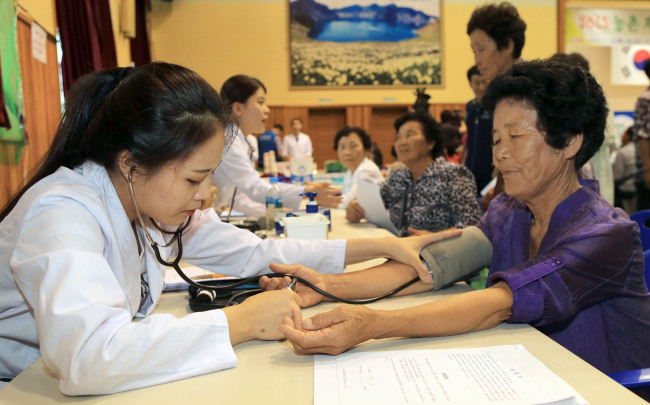The number of bipolar disorder patients has increased significantly over the last five years in South Korea, especially among the nation’s elderly population, a study showed Wednesday.
According to the study released by Saenuri Rep. Park Yoon-ock, the number of Koreans who developed the mental illness ― which is characterized by fluctuating periods of elevated mood and depression ― increased from 53,056 in 2010 to 75,616 in 2014.
The increase was especially striking in Koreans aged 60 or older, who accounted for 25.2 percent of all patients with the disorder. The number of bipolar patients in their 80s, in particular, increased by 215 percent from 1,057 to 3,339 in the same time period.

An elderly Korean woman receives a health check-up at a medical facility. (Yonhap)
Meanwhile, the number of patients in their 60s increased from 5,953 to 8,992, while the number of those in their 70s surged dramatically from 3,754 to 6,735.
Some of the factors that may increase the risk of developing the condition include periods of high stress, alcohol abuse and major life changes or traumatic experiences, such as the death of a loved one. People with bipolar disorder are also likely to have an anxiety disorder, attention-deficit and hyperactivity disorder or post-traumatic stress disorder.
According to a 2011 study by Stavanger University Hospital in Norway, bipolar disorder patients had lower social and occupational function than the general population. Also, a significantly higher proportion of patients with the mental disorder was single, had lower income and had physical disabilities than the general public.
Korea’s elderly poverty rate marked 48 percent in 2013, which was 3.5 times higher than the national average at 13.7 percent, and the highest among the Organization for Economic Cooperation Development countries. The OECD average was 12.6 percent.
Almost 90 percent of the elderly were suffering from at least one chronic illness such as diabetes and high blood pressure, while one-third were either depressed or obese as of last year. As of last year, 62.5 percent of all Koreans aged 65 or older either only attended elementary school or never received any education at all.
“The statistics suggest that the elderly population may be under a lot of stress and there should be more government support for the health and quality of life of the elderly,” said lawmaker Park.
By Claire Lee (dyc@heraldcorp.com)






